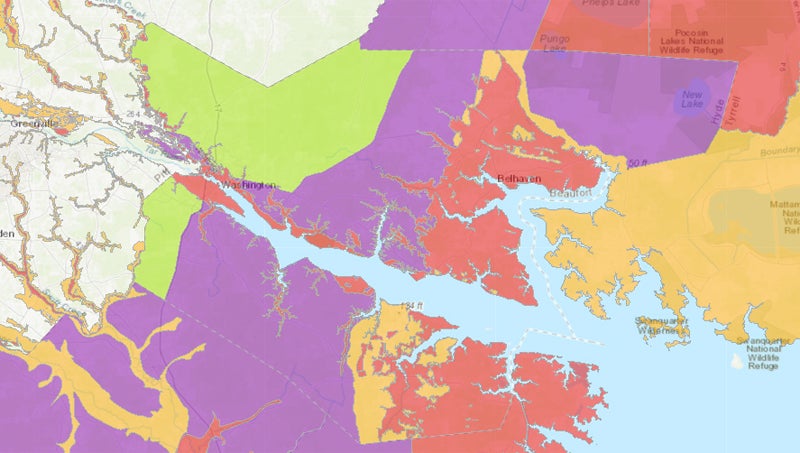Putting together a hurricane plan
Published 4:54 pm Thursday, May 7, 2020

- KNOW YOUR ZONE: A new tool from the North Carolina Department of Public Safety, the “Know Your Zone” website allows eastern North Carolina residents to look up their address to determine their evacuation zone. These zones in turn will be used by local emergency management agencies to help determine risks during a hurricane. (N.C. Department of Public Safety)
|
Getting your Trinity Audio player ready...
|
For many Beaufort County residents, revisiting one’s hurricane plan is a regular task during the spring season. But with the COVID-19 pandemic possibly overlapping with this year’s hurricane season, state officials are urging North Carolinians to make preparations now.
“North Carolina knows all too well the damage and disruption that hurricanes can bring, but being prepared can help people fare better and recover quicker,” said North Carolina Gov. Roy Cooper. “Especially with COVID-19 affecting everyone’s daily lives, now is the time to make sure you and your family are ready this hurricane season.”
According to the National Weather Service, North Carolinians should start preparations now for the storm season which starts June 1. During Hurricane Preparedness week, the NWS has provided some guidelines for what steps people should take now to be ready:
- Determine your risk — Find out today what kind of wind and water hazards could occur where you live and make plans for how to handle them. Consider reviewing historical storm information available at coast.noaa.gov/hurricanes.
- Develop an evacuation plan — To some degree, every part of Beaufort County falls into an evacuation zone. This year, the North Carolina Department of Public Safety has rolled out a new tool called “Know Your Zone,” which displays a map of eastern North Carolina evacuation zones. Local residents can type in their address at knowyourzone.nc.gov, to learn about the risk in their area. When considering your evacuation planning during the COVID-19 pandemic, planning to stay at a hotel, or with friends or family who live farther inland, are better options than relying on a large emergency shelter.
- Double-check your insurance — Call your insurance company or agent and ask for an insurance check-up to make sure you have enough homeowners insurance to repair or even replace your home. Don’t forget coverage for your vehicles or boat. Remember, standard homeowners insurance doesn’t cover flooding. Whether you’re a homeowner or renter, you’ll need a separate policy for it, and it’s available through your company, agent or the National Flood Insurance Program at floodsmart.gov. Flood insurance requires a 30-day waiting period.
- Strengthen your home — If you plan to ride out the storm in your home, make sure it is in good repair and up to local hurricane building code specifications. Many retrofits are not as costly or time consuming as you may think. Have the proper plywood, steel or aluminum panels to board up the windows and doors. Remember, the garage door is the most vulnerable part of the home, so it must be able to withstand the winds.
- Help your neighbors — Many Americans rely on their neighbors after a disaster, but there are also many ways you can help your neighbors before a hurricane approaches. Learn about all the different actions you and your neighbors can take to prepare and recover from the hazards associated with hurricanes. Start the conversation now with these “Neighbor Helping Neighbor” strategies but remember you may need to adjust your preparedness plans based on the latest health and safety guidelines from the CDC and your local officials.
- Prepare a written plan — The time to prepare for a hurricane is before the season begins, when you have the time and are not under pressure. If you wait until a hurricane is on your doorstep, the odds are that you will be under duress and will make the wrong decisions. Take the time now to write down your hurricane plan. Know who issues evacuation orders for your area, determine locations where you can ride out the storm and start to get your supplies now.
The North Carolina Department of Public Safety recommends families include the following in their emergency supply kits:
- Food/water for every member of your family for several days
- Copies of insurance cards/papers and identification sealed in a watertight plastic bag
- First-aid kit
- Weather radio and batteries
- Prescription medicines
- Sleeping bag or blankets
- Changes of clothes
- Hygiene items such as toothbrush, toothpaste, soap and deodorant
- Cash
- Pet supplies including food, water, leashes, bedding, muzzle and vaccination records
- Hand sanitizer
- Face masks
For more information on planning for the upcoming hurricane season, visit www.readync.org and www.weather.gov/wrn/hurricane-preparedness.





